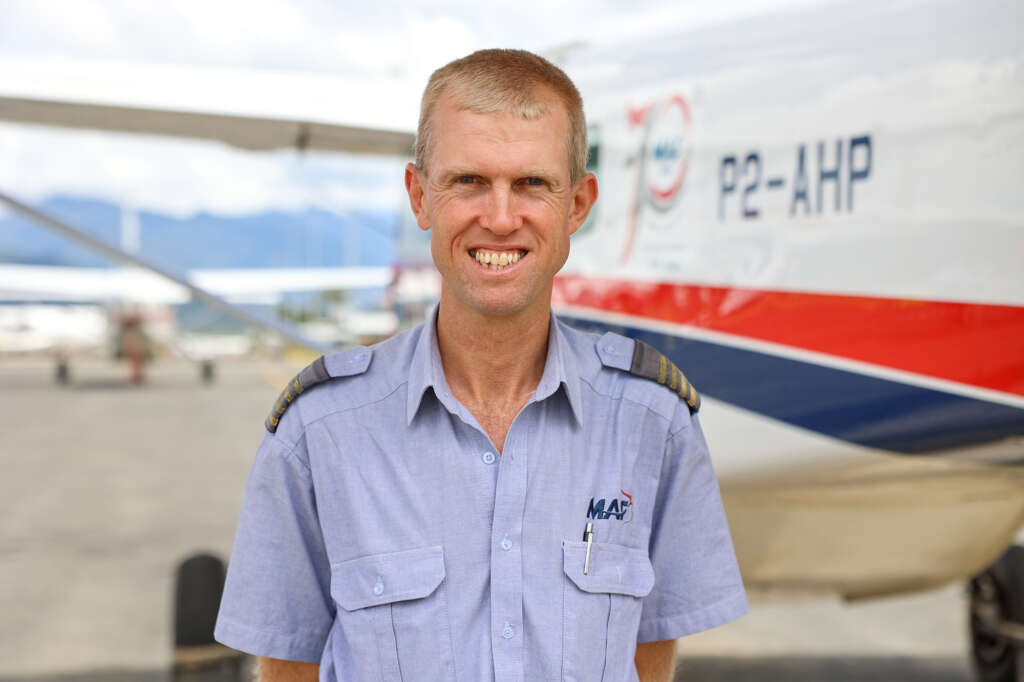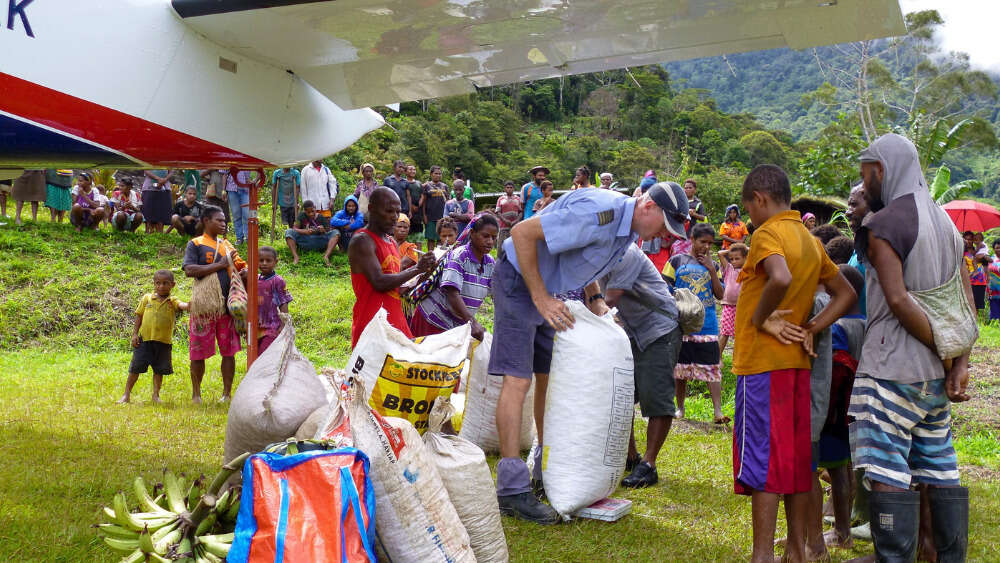MAF Australia’s Richie Axon has served as a pilot in Papua New Guinea since 2010. Along with his family, he is based in Telefomin, an outstation in the west of Papua New Guinea.
I grew up with parents who followed Jesus. We moved around when I was a child, as my dad worked on farms in New South Wales. By Australian standards, we were not rich, but we never went hungry and always had lots of fun together as a family. We always went to church on Sunday, but God was part of our life all through the week.
When I was seven, our church went on a family camp for a weekend. The lady who ran the kids’ program explained the gospel to us, and I trusted Jesus as my Lord and Saviour because (based on John 3:16) he died for my sin. I am still growing in my understanding of what a wonderful thing he has done for me.
Becoming a MAF pilot
My aunt was a nurse in Papua New Guinea, working with the Australian Baptist Missionary Society in the Baiyer at Kumbwareta. I also read stories of missionaries like Hudson Taylor and Eric Liddell (China), Jim Elliot (Ecuador) and Richard Wurmbrand (Romania), and I wanted to do something for God with my life.
I first knew about MAF when I saw a poster of a brown and yellow MAF Cessna flying over the jungle. I didn’t know anything about them, but knew that flying aeroplanes and working for God would be the best job in the world. So all through school and after leaving home, I had this thought that one day I would like to be a missionary pilot.
In 2006, about a year after my wife and I got married, we decided to go Bible college, since we had no debts or other commitments and it seemed a good opportunity to be equipped for what God might have for us later on. While we were at Bible college (2007-2008), we realised that now was a good time to get involved in mission, so we applied to MAF and were accepted. In 2010 we arrived in PNG, when our first child was six months old.
We never had a specific call from God as some people seem to have, but believe that he wants “committed volunteers,” and that it’s the work of all his people to tell the story with our words and actions of the One who has brought us out of darkness into his light (1 Peter 2:9).
A typical day as a MAF pilot
Usually, I start work at 7am. I unlock the office and turn on the computer and check any NOTAMS (Notices to Airmen) that apply to the day’s program. Then I unlock the aeroplane and do the daily inspection. Once the base staff have completed the manifest and got weather reports and loaded the aeroplane, we pray as a team, asking for God’s blessing of strength and wisdom, for pilots and ground staff. This is really vital and probably the most important thing we can do all day. We are all in his hands, but so easily forget it.
The flying for the day has been planned by the programmer, who does their best to consider weather and loading and “a thousand” other things. I like to talk about having a “preference sheet” instead of a “flight plan” because so often there are changes as we go through the day.
The day usually follows the pattern of filling the manifest and loading, startup, take off, fly to the destination, land, shutdown, unload and repeat.
What we carry in the aeroplane is really varied – it may be building materials for a school or house, medical supplies for aid posts or school supplies. Our passengers might be pastors or Bible school teachers, students or medevac patients, workers travelling to or from their village or just people going someplace. I really enjoy having time to talk to people at the different airstrips, and hope that most of the time I’m a blessing.
We get back to Telefomin anywhere from 14:30 – 17:00, depending on the weather and how many changes come up. Then there is about 30-45 minutes of paper and computer work, checking emails and reviewing the next day’s programme before going home. I live about 50 metres from the base, so I love the short walk to get home.

Richie Axon MAF Australia
The best parts of my job
As a pilot, I enjoy getting outside and going somewhere. I like working with machinery and the challenges of fitting things into the aeroplane. I enjoy working with people.
Working with MAF, I thank God we are able to help overcome the isolation for people, knowing that short flights are equal to days of hard walking.
As a pilot in PNG, I enjoy the constant variety of weather, terrain, loading, almost everything about the work.
I try to pray with each medevac patient that I fly, and I’ve been really blessed later when someone came up to me and said “Thank you for praying for me. God has healed me and now I’m well enough to go home.” I pray that God would grant them spiritual life as well.
The challenges
Knowing that the flying we do has such an impact makes it hard to say no, because when we say no it means that someone misses out. In those times, I have to pray and trust God with the outcome, believing that he is in control and that he always does what is good.
Sometimes we start thinking too much about the revenue or getting all the flying done, and miss opportunities to care for people and share the hope we have in Jesus. With all the work we try to do, it can be hard to be sensitive to the opportunities.
Family life as missionaries in Papua New Guinea
My wife and I together made the decision to follow Jesus into mission, and we didn’t feel that God was leading us to one specific place. So we said to MAF that we would go where we were most needed and that was Papua New Guinea. In the 12 years that we’ve been with MAF in PNG, there have been some hard times, especially for my wife, but we remind ourselves that we didn’t come here for the lifestyle, although there are things we enjoy about living and working here.
We came to use what God has given us, to serve others so they would know how great he is and hopefully come to know and trust him for themselves. He is our provider, so we keep going.
Our kids have spent their lives between PNG and Australia, so it’s partly home for them. Sometimes people think that having a choice will make them happy, but actually, having a purpose and being loved are more important. So we love our kids and remind them of God’s love, and of why we do what we do. They have good days and bad days, like all of us. We are blessed these days with the internet and so many resources for schooling, and they play with their PNG friends, so really they don’t miss out on much that matters.
Email This Story
Why not send this to a friend?


